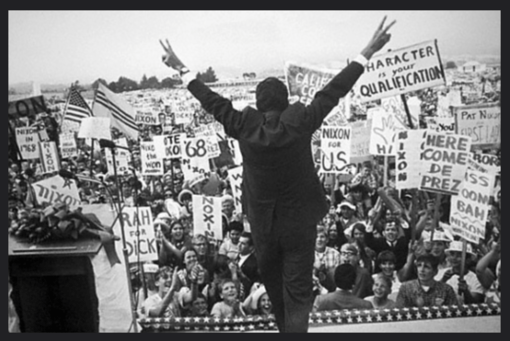
Photo by Cody McComas | CC BY 2.0
Early in Richard Nixon’s presidency, he told his chief of staff Bob Haldeman that his secret strategy for ending the Vietnam War was to threaten the use of nuclear weapons. Nixon opined that President Eisenhower’s nuclear threats in 1953 brought a quick end to the Korean War, and that he planned to use the same principle of threatening maximum force. Nixon called it the “madman theory,” getting the North Vietnamese to “believe…I might do anything to stop the war.”
Ironically, Daniel Ellsberg, who famously leaked the Pentagon Papers, may have been responsible for introducing the theory in his lectures in 1959 to Henry Kissinger’s Harvard seminar on the conscious political use of irrational military threats. Ellsberg called the theory the “political uses of madness,” and he noted that any extreme threat would be more credible if the person making the threat were perceived as not being fully rational. Ellsberg couldn’t imagine that an American president would ever consider such a strategy, but he believed that irrational behavior could be a useful negotiating tool.
It is noteworthy that Kissinger, who became Nixon’s national security adviser ten years later, said that he “learned more from Dan Ellsberg than any other person about bargaining.” And in his book “Nuclear Weapons and Foreign Policy,” he advocated a “strategy of ambiguity” in any discussion of the use of tactical nuclear weapons. Kissinger’s writings in the 1950s, moreover, suggest that Nixon’s madman theory was an extension of Kissinger’s belief that power wasn’t power unless one was willing to use it.
Of course, nuclear weapons weren’t used in Vietnam, but the secret war in Cambodia and the unconscionable carpet bombing in Vietnam were designed to convince Hanoi to make concessions to the United States. These tactics didn’t elicit concessions from Hanoi and didn’t curtail the operational abilities of North Vietnamese forces, but Kissinger loved “playing the bombardier” along with his military aide General Alexander Haig. He loved screening the raids and demanded the raw intelligence on the bombing. Kissinger and Nixon believed in the logic of escalation, although the results indicated futility and failure.Let’s fast forward several decades to the current situation. The United States has an authoritarian president who is attracted to power and has surrounded himself with “yes men.” In the past several days, Trump has appointed a new director of the Central Intelligence Agency, Gina Haspel, who was a key player in the use of sadistic torture and abuse in secret prisons. He has appointed a new secretary of state, Mike Pompeo, who believes in torture and abuse, and supports the idea of regime change in both Iran and North Korea. And now we have a new national security adviser, John Bolton, who has recommended the use of force and regime change in Iran and North Korea as well.
Over the past year, there has been accumulating evidence that Donald Trump is unfit to serve as the commander in chief. He is an extreme and unbridled hedonist who has no interest in the consequences of his actions. His personal life style, his personnel policies, his Twitter rants, and his political actions point to self-absorption that overrides any such concerns. Trump is not a theoretician so we are not talking about a considered “madman” approach. Rather, we have to consider an actual “madman” president who has appointed another “madman” to run his National Security Council
The thought of Trump and Bolton discussing national security and the use of force in the White House is simply frightening. Both men have displayed an impulsiveness and explosiveness that seems to point to megalomania. Nixon’s biographers described him as sharp and analytical with a remarkable memory; Trump’s biographers point to dangerous elements of irritability and aggressiveness as well as a pattern of deceitful behavior in his personal and professional life. Bolton is more hawkish than Trump.
Both Trump and Bolton have engaged in irresponsible talk about nuclear weapons. Trump told interviewers that there is no point in having nuclear weapons if we’re not willing to use them. Bolton still defends the use of force in Iraq, and favors it in dealing with both Iran and North Korea. He played a key role in politicizing the intelligence to justify the war in Iraq and, as UN ambassador, misused intelligence to make false statements in the General Assembly and the Security Council regarding policy toward Syria and Cuba.
Two secretaries of state, Colin Powell and Rex Tillerson, refused to accept Bolton as a deputy secretary because of his extremist views and his brutal treatment of underlings. It is interesting that Bolton has already described his job of national security adviser as making sure that the bureaucracy doesn’t impede the decisions of the president. One of the primary tasks of the national security adviser is to be an honest broker, bringing different views to the president. This is clearly not Bolton’s modus operandi.
Our democracy depends to a large degree on citizens having trust in the sense and sensibility of our leaders. In a world that appears to be spinning out of control, it is simply not possible to have faith in the decision making of our current leadership. The madman theory of policy is a debatable subject, but the thought of having actual madmen in positions of power is frightening. At the point of its dissolution in 1991, the Soviet Union found that its leaders were no longer believable to its people. The increased cynicism of Americans and their opinion leaders will change the nature of our democracy.